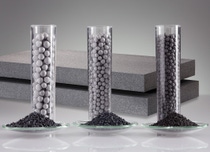Actualités & Médias
BASF increases production capacity of Neopor®
- Global capacity expansion for Neopor by 40,000 metric tons per year
- In Korea, BASF´s white foam granulate Styropor will be replaced with the gray Neopor
- Strong demand in all regions for the high-performance, gray insulation material
BASF is increasing its global production capacity for Neopor® (expandable polystyrene containing graphite) by a total of 40,000 metric tons per year. Adjustments in the plants at the two production sites in Ludwigshafen, Germany, and Ulsan, Korea, will take place through the fourth quarter of 2018.
At the Ulsan site in Korea, BASF will switch the plant´s entire 85,000 metric tons capacity from the classic white EPS (expandable polystyrene) Styropor® to the improved insulation raw material Neopor (gray EPS) until end of 2018. This will allow the company to meet the growing demand for the gray material in the Asian market.
After a series of debottlenecking measures, the Ludwigshafen plant is now capable of producing 200,000 metric tons of Neopor a year. The annual production capacity for Styropor and Neopor at this location has been increased from 440,000 to a total of 460,000 metric tons.
The trend towards gray
The raw material is processed into insulation boards, which contribute to substantial savings of heating energy in new construction and renovations. Thus, the demand has risen steadily worldwide. Since introducing the product in 1998, BASF has continuously adapted Neopor´s production capacity. Compared with Styropor, the graphite containing insulation boards offer better insulation performance. Due to the lower density, lighter boards can be produced, making construction more efficient and saving material at the same time.
“With this step, we are offering even more customers a product that has been further developed in economic as well as environmental terms to meet the challenges we face with regard to climate protection and resource conservation. Worldwide, around 45% of total oil consumption and CO2 emissions – 40% in Germany – is caused by the heating and cooling of buildings. This can be significantly reduced by comprehensive, efficient insulation, supplemented by optimized building equipment and the appropriate use of alternative energy sources,” said Klaus Ries, Head of Global Business Management Styrenic Foams at BASF.
Inventor of white and gray EPS
BASF invented and patented Styropor, the well-known, white foam granulate, in 1951, and launched Neopor 20 years ago as the first graphite containing EPS. The gray, plastic granulate Neopor is an advanced version of the classic white insulation material Styropor. By adding graphite, which gives the material its gray color, the insulation performance of the boards is increased by up to 20%. The use of raw material drops by up to 40% compared with the white material. This enables the processor to produce insulation boards with a lower mass but better insulation performance. The finished insulation products made of Neopor can be used in a range of applications, particularly for insulating exterior and interior walls and flat roofs.
Receive the latest press releases from BASF via WhatsApp on your smartphone or tablet. Register for our news service at basf.com/whatsapp-news.
About BASF´s Performance Materials division
BASF’s Performance Materials division encompasses the entire materials know-how of BASF regarding innovative, customized plastics under one roof. Globally active in four major industry sectors – transportation, construction, industrial applications and consumer goods – the division has a strong portfolio of products and services combined with a deep understanding of application-oriented system solutions. Key drivers of profitability and growth are our close collaboration with customers and a clear focus on solutions. Strong capabilities in R&D provide the basis to develop innovative products and applications. In 2017, the Performance Materials division achieved global sales of €7.7 bn. More information online: www.performance-materials.basf.com
About BASF
At BASF, we create chemistry for a sustainable future. We combine economic success with environmental protection and social responsibility. The more than 115,000 employees in the BASF Group work on contributing to the success of our customers in nearly all sectors and almost every country in the world. Our portfolio is organized into five segments: Chemicals, Performance Products, Functional Materials & Solutions, Agricultural Solutions and Oil & Gas. BASF generated sales of €64.5 billion in 2017. BASF shares are traded on the stock exchanges in Frankfurt (BAS), London (BFA) and Zurich (BAS). Further information at www.basf.com.
P-18-230


